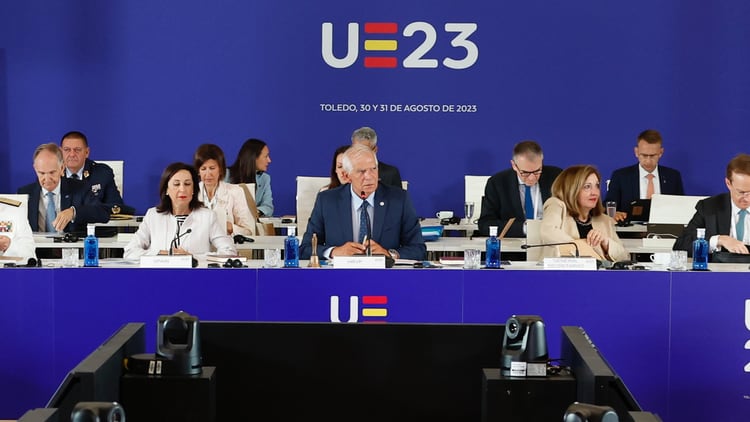The Diplomat
The European Union’s defence ministers, who held an informal meeting in Toledo yesterday, expressed their concern over the situation in Africa, following several coups d’état, most recently in Gabon.
The meeting, called by the Spanish Presidency of the EU, was chaired by the High Representative for Foreign Affairs and Security Policy, Josep Borrell, and the acting Spanish Minister of Defence, Margarita Robles, who appeared before journalists at the end of the meeting, held in the Old Arms Factory in Toledo.
As they explained, the two main issues discussed were support for Ukraine in the face of the Russian invasion, and the situation in various parts of Africa, particularly the Sahel, following the coup d’état perpetrated on 26 July in Niger. On this point, Borrell said he was in favour of the EU-27 sanctioning the military junta that has seized power, and reiterated Brussels’ support for the decisions taken by the Economic Community of West African Countries (Ecowas), although he specified that any possible military intervention should be carefully analysed.
Margarita Robles, for her part, pointed to the need for “a comprehensive analysis” of the situation in Africa in order to make decisions on the future of the missions that the EU has deployed on the continent, in which Spain participates.
The minister insisted that Europe is committed to development in Africa, and recalled that Spain has military personnel deployed in Mali, the Central African Republic and South Africa. In any case, she insisted that it was up to the EU-27 to decide whether to reconsider Spain’s presence in the missions in these countries.
Both Borrell and Robles expressed the European ministers’ “concern” at the latest events in Gabon, where a group of soldiers have staged a coup d’état against the president, Ali Bongo.
The situation in Africa was also discussed at the lunch that the defence ministers subsequently held with the EU Foreign Affairs ministers, who will hold their informal meeting (Gymnich) today at the same venue in Toledo.
At this lunch, Robles insisted that, despite the growing difficulties in Africa, it is necessary to persevere in our efforts, “demonstrating, she said, Europe’s commitment to security in the region, listening to Africans to find out their real needs, and not leaving gaps that could be exploited by hostile actors”.
The other major topic of the informal meeting of the defence ministers was Ukraine, with the country’s defence minister, Oleksii Reznikov, providing information by videoconference, and reviewing the progress made in the various initiatives to support Ukraine that are underway within the framework of the European Union.
In this respect, Borrell reiterated the EU-27’s willingness to consider including the training of Ukrainian pilots who will have to operate the F-16s requested by Kyiv in the European training mission.
Spain, for its part, underscored its commitment to medical aid, both by taking in new wounded and amputees to be treated in our military hospitals, and by sending surgical and medical material to support the recently donated ROLE 2+ type deployable field hospital. Minister Robles also announced that Spain is considering contributing, in collaboration with other partners, to Ukraine’s future cyber-defence capability, and was particularly pleased with the results of the training of Ukrainian soldiers in the Military Assistance Mission, which has already far exceeded initial expectations.
The meeting of ministers also discussed the global repercussions of Russia’s aggression against Ukraine. They were joined by the UN Under-Secretary General for Peace Operations and NATO’s Deputy Secretary General for Defence Policy and Planning. The ministers assessed the possible security guarantees that the European Union can provide to Ukraine in the long term, in order to deter further Russian aggression in the future.
Robles expressed her conviction that the time has come for a greater role for the European defence industry in sustaining support for Ukraine in the long term. We must ensure,” she said, “that the substantial financial packages we approve not only help Ukraine, but also help create jobs by boosting the European defence industry.






